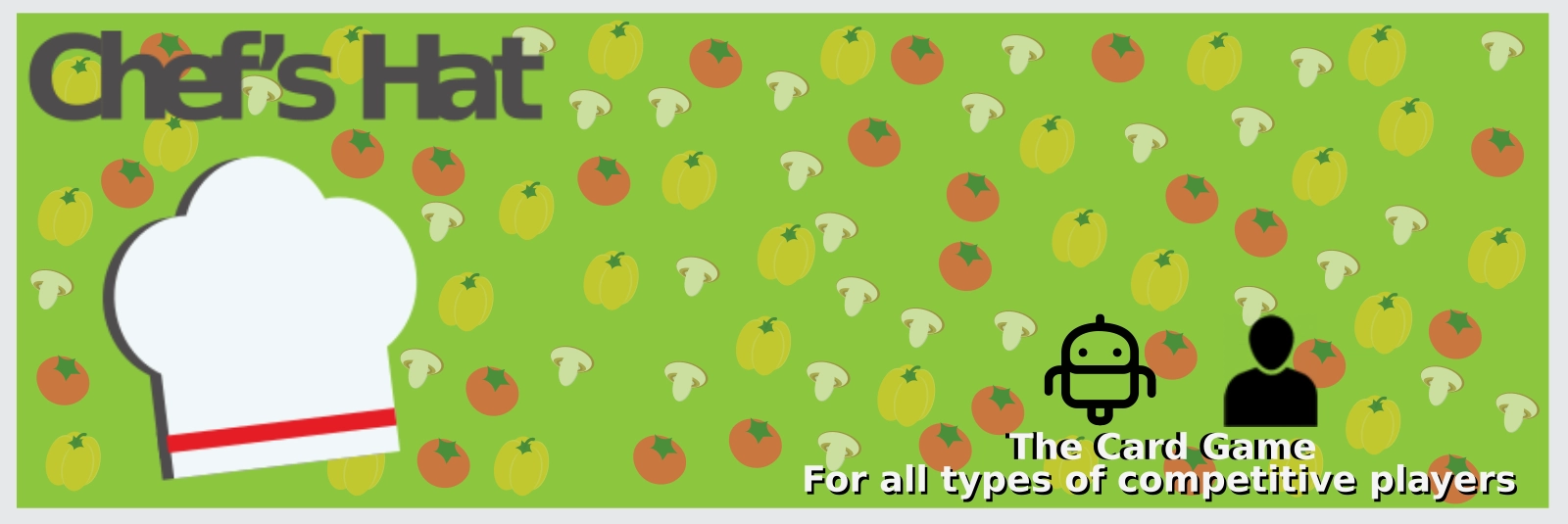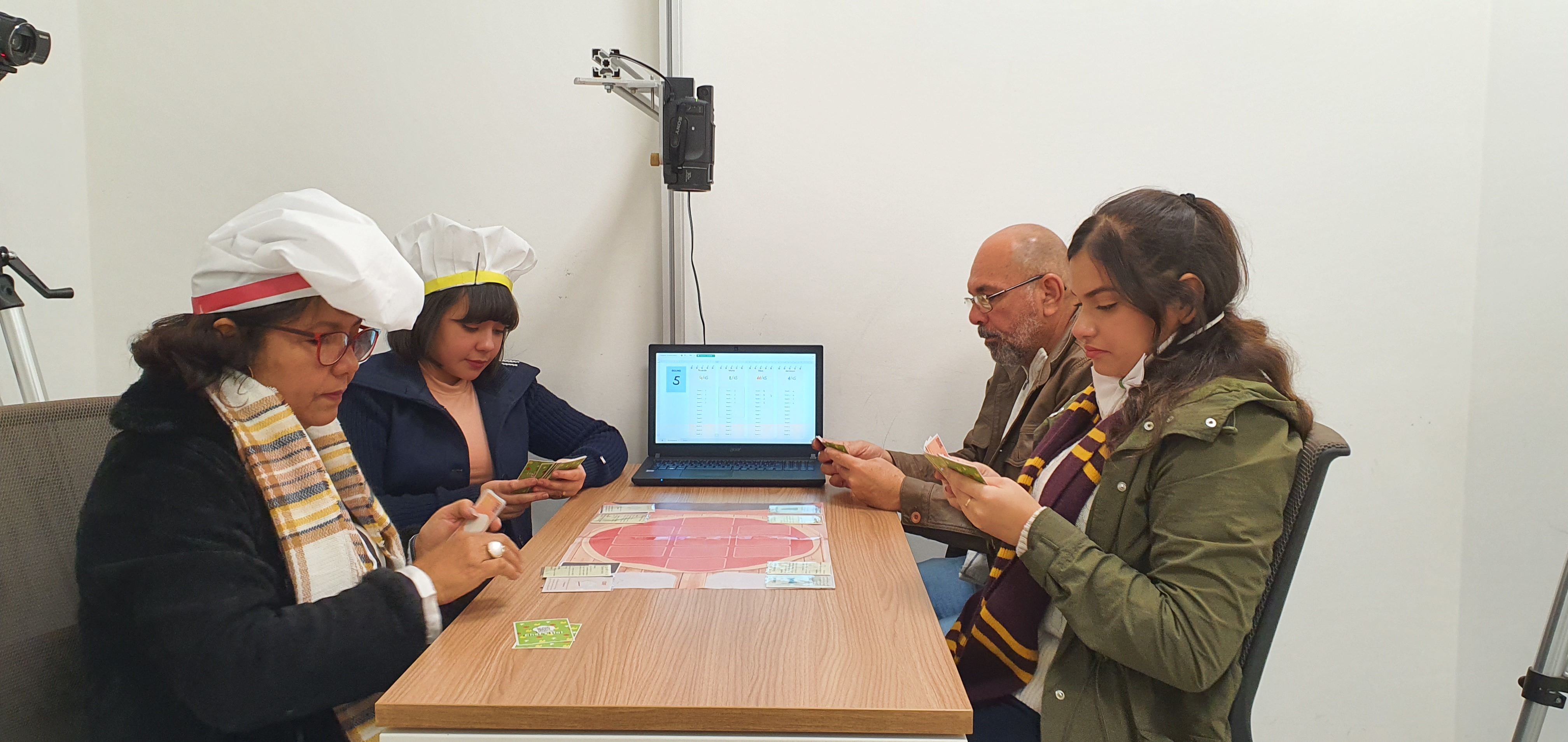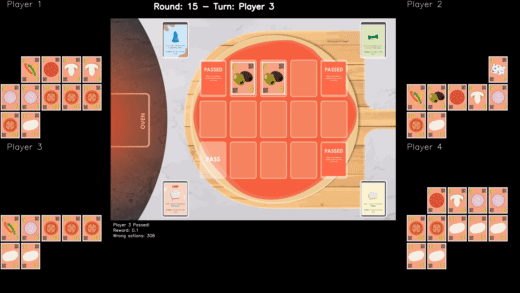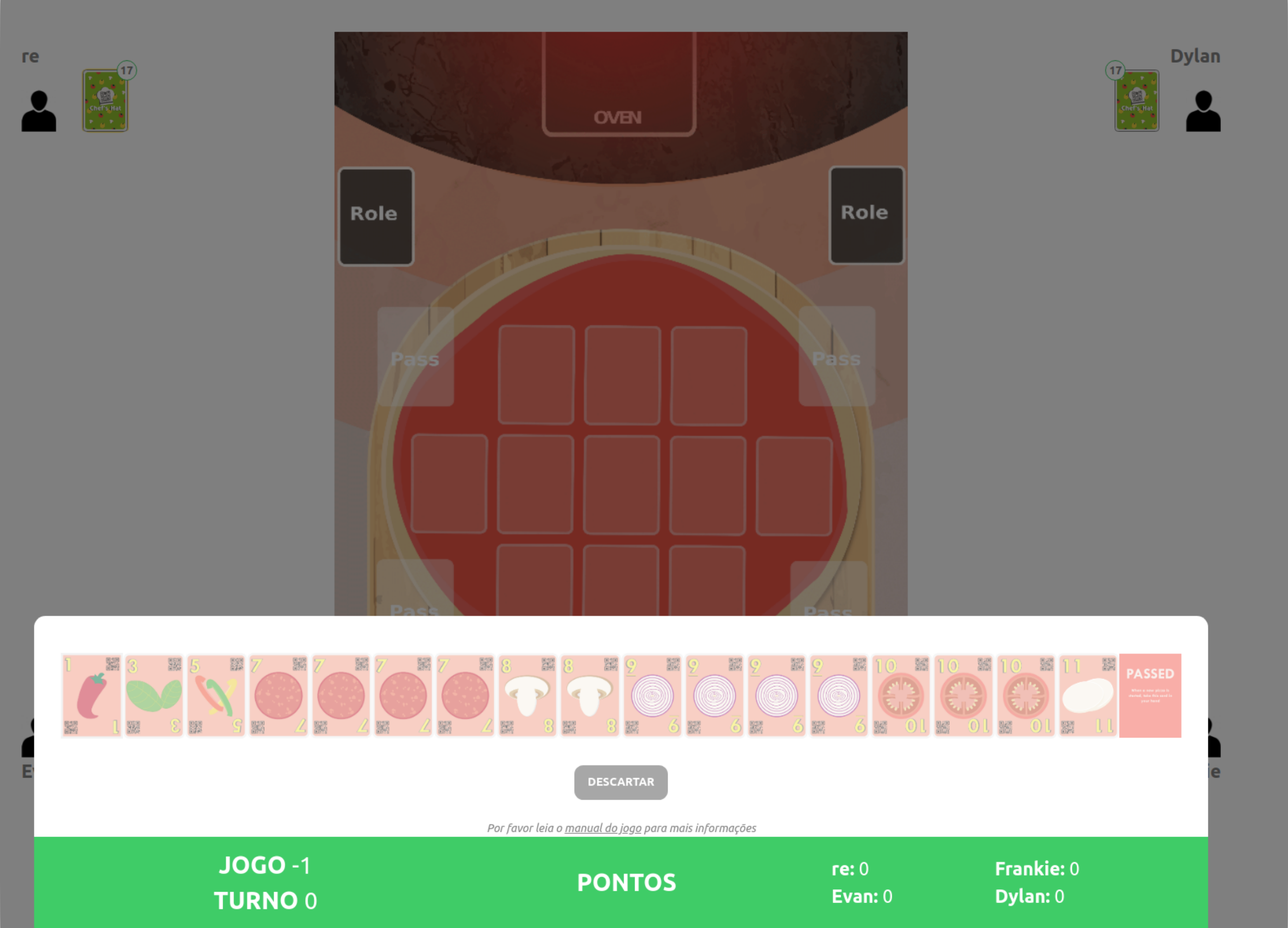This repository holds the ChefsHatGym2 environment, which contains all the necessary tools to run, train and evaluate your agents while they play the Chef`s Hat game.
With this library, you will be able to:
- Encapsulate existing agents into the game
- Run the game locally, on your machine
- Run the game room as a server
- Connect agents to a server room and run games
- Export experimental results, game summaries and agents behavior on a easy-to-read format
- Evaluate agents using different evaluation tools and visualizations
Full documentation can be found here: Documentation.
We also provide a list of existing plugins and extensions for this library:
The Chef’s Hat Player’s Club is a collection of ready-to-use artificial agents. Each of these agents were implemented, evaluated, and discussed in specific peer-reviewed publications and can be used at any time. If you want your agent to be included in the Player’s Club, send us a message.
Comming soon...
The Chef's Hat Environment provides a simple and easy-to-use API, based on the OpenAI GYM interface, for implementing, embedding, deploying, and evaluating reinforcement learning agents.
Fora a complete overview on the development of the game, refer to:
- It's Food Fight! Introducing the Chef's Hat Card Game for Affective-Aware HRI (https://arxiv.org/abs/2002.11458)
- You Were Always on My Mind: Introducing Chef’s Hat and COPPER for Personalized Reinforcement Learning (https://www.frontiersin.org/articles/10.3389/frobt.2021.669990/full)
- The Chef's Hat rulebook The Chef's Hat rulebook.
If you want to have access to the game materials (cards and playing field), please contact us using the contact information at the end of the page.
You can use our pip installation:
pip install chefshatgymRefer to our full documentation for a complete usage and development guide.
The basic structure of the simulator is a room, that will host four players, and initialize the game. ChefsHatGym2 encapsulates the entire room structure, so it is easy to create a game using just a few lines of code:
# Start the room
room = ChefsHatRoomLocal(
room_name="local_room",
verbose=False,
)
# Create the players
p1 = AgentRandonLocal(name="01")
p2 = AgentRandonLocal(name="02")
p3 = AgentRandonLocal(name="03")
p4 = AgentRandonLocal(name="04")
# Adding players to the room
for p in [p1, p2, p3, p4]:
room.add_player(p)
# Start the game
info = room.start_new_game(game_verbose=True)For a more detailed example, check the examples folder.
ChefsHatGym2 allows the creation of a gameroom server. Agents running in different machines can connect to the room server via simple TCP connection. A server room structure and remote agents is supported by the library, as shown in our examples folder.
ChefsHatGym2 provides an interface to encapsulate agents. It allows the extension of existing agents, but also the creation of new agents. Implementing from this interface, allow your agents to be inserted in any Chef`s Hat game run by the simulator.
Runing an agent from another machine is supported directly by the ChefsHat agent interface. By implementing this interface, your agent gets all the local and remote agent functionality and can be used by the Chef`s Hat simulator.
Here is an example of an agent that only select random actions:
The Chef’s Hat Online encapsulates the Chef’s Hat Environment and allows a human to play against three agents. The system is built using a web platform, which allows you to deploy it on a web server and run it from any device. The data collected by the Chef’s Hat Online is presented in the same format as the Chef’s Hat Gym, and can be used to train or update agents, but also to leverage human performance.
Moody Framework is a plugin that endowes each agent with an intrinsic state which is impacted by the agent's own actions.
All the examples in this repository are distributed under a Non-Comercial license. If you use this environment, you have to agree with the following itens:
- To cite our associated references in any of your publication that make any use of these examples.
- To use the environment for research purpose only.
- To not provide the environment to any second parties.
-
Barros, P., Yalçın, Ö. N., Tanevska, A., & Sciutti, A. (2023). Incorporating rivalry in reinforcement learning for a competitive game. Neural Computing and Applications, 35(23), 16739-16752.
-
Barros, P., & Sciutti, A. (2022). All by Myself: Learning individualized competitive behavior with a contrastive reinforcement learning optimization. Neural Networks, 150, 364-376.
-
Barros, P., Yalçın, Ö. N., Tanevska, A., & Sciutti, A. (2022). Incorporating Rivalry in reinforcement learning for a competitive game. Neural Computing and Applications, 1-14.
-
Barros, P., Tanevska, A., & Sciutti, A. (2021, January). Learning from learners: Adapting reinforcement learning agents to be competitive in a card game. In 2020 25th International Conference on Pattern Recognition (ICPR) (pp. 2716-2723). IEEE.
-
Barros, P., Sciutti, A., Bloem, A. C., Hootsmans, I. M., Opheij, L. M., Toebosch, R. H., & Barakova, E. (2021, March). It's Food Fight! Designing the Chef's Hat Card Game for Affective-Aware HRI. In Companion of the 2021 ACM/IEEE International Conference on Human-Robot Interaction (pp. 524-528).
-
Barros, P., Tanevska, A., Cruz, F., & Sciutti, A. (2020, October). Moody Learners-Explaining Competitive Behaviour of Reinforcement Learning Agents. In 2020 Joint IEEE 10th International Conference on Development and Learning and Epigenetic Robotics (ICDL-EpiRob) (pp. 1-8). IEEE.
-
Barros, P., Sciutti, A., Bloem, A. C., Hootsmans, I. M., Opheij, L. M., Toebosch, R. H., & Barakova, E. (2021, March). It's food fight! Designing the chef's hat card game for affective-aware HRI. In Companion of the 2021 ACM/IEEE International Conference on Human-Robot Interaction (pp. 524-528).
Get more information here: https://www.chefshatcup.poli.br/home
Get more information here: https://www.whisperproject.eu/chefshat#competition
Pablo Barros - pablovin@gmail.com




